Operational Management Skills in Healthcare: NHS Case Study Analysis
VerifiedAdded on 2023/01/10
|9
|2722
|63
Report
AI Summary
This report delves into the intricacies of operational management within the healthcare sector, using the NHS as a case study. It begins by outlining the roles and responsibilities of an operational manager, emphasizing the importance of personal skills such as communication, teamwork, and decision-making. The report then explores various leadership theories, including the Great Man theory, trait theory, behavioral theory, transactional theory, and transformational theory, and discusses their application in aligning management styles. Furthermore, it examines theoretical models of leadership, such as autocratic and laissez-faire styles, commonly used in healthcare settings. The report also analyzes strategies for resolving conflicts, including avoiding, accommodating, compromising, competing, and collaborating. Finally, the report concludes by suggesting strategies for improving healthcare provision, ensuring efficient processes and patient satisfaction. This report is contributed by a student to Desklib, a platform offering AI-based study tools for students.
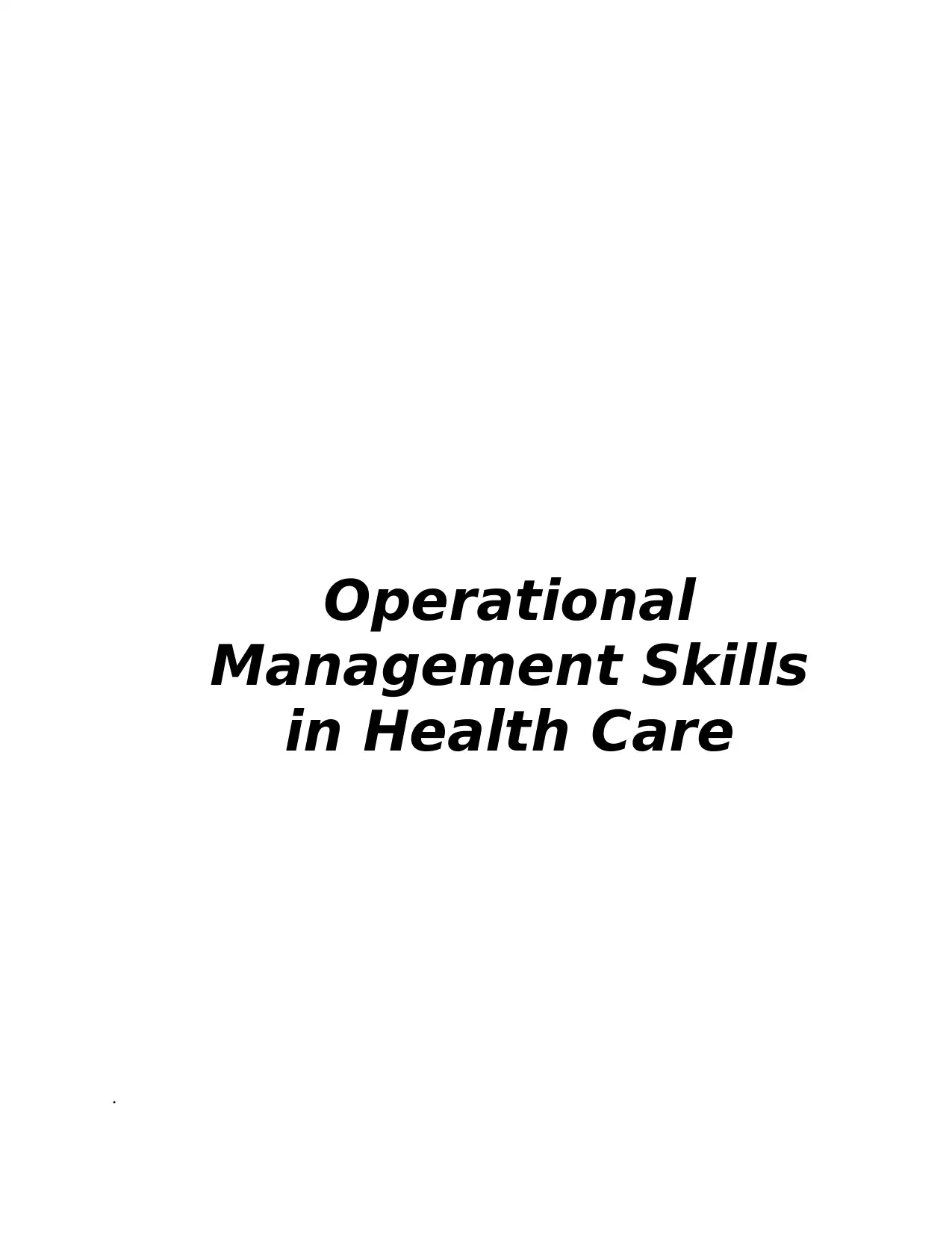
Operational
Management Skills
in Health Care
.
Management Skills
in Health Care
.
Paraphrase This Document
Need a fresh take? Get an instant paraphrase of this document with our AI Paraphraser
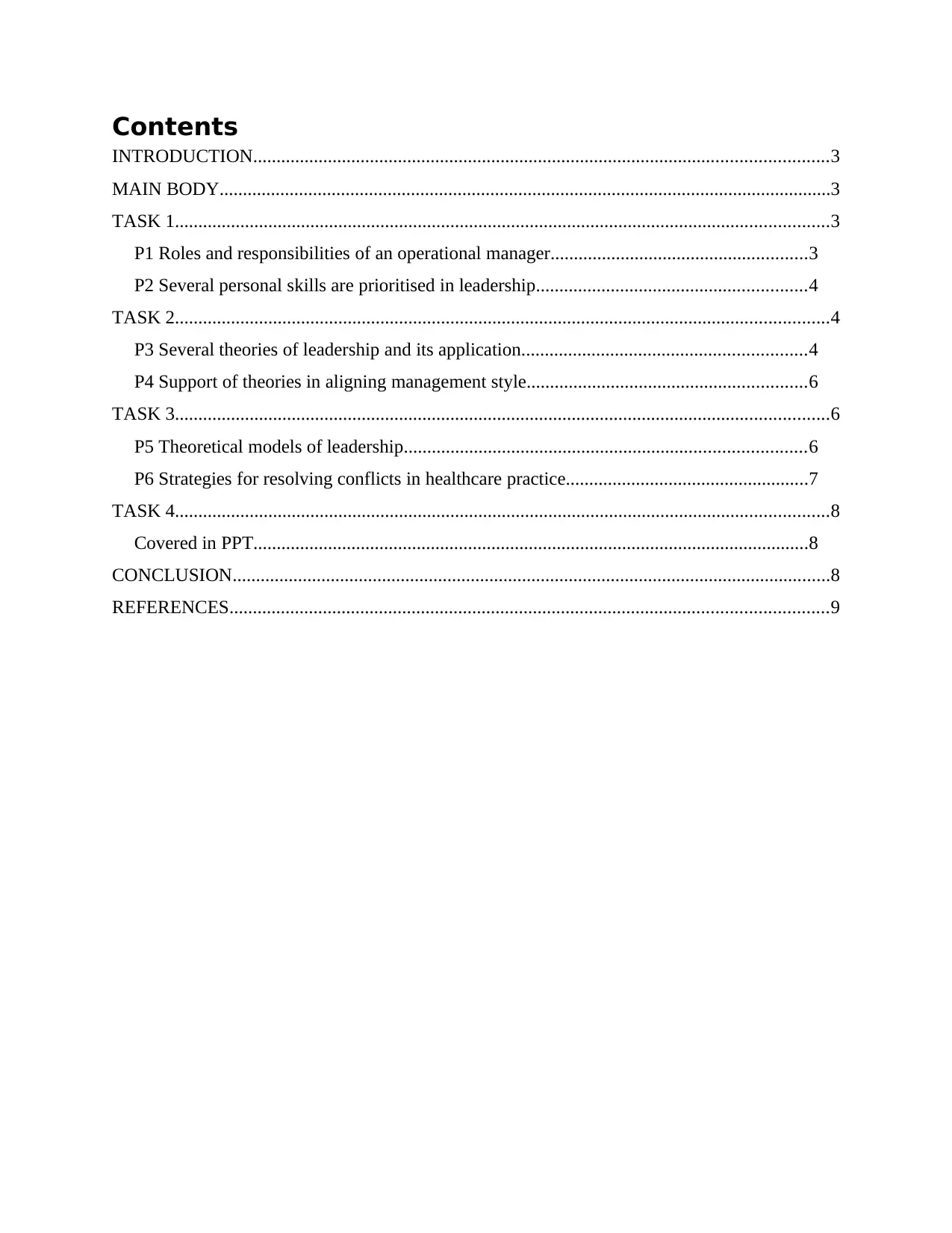
Contents
INTRODUCTION...........................................................................................................................3
MAIN BODY...................................................................................................................................3
TASK 1............................................................................................................................................3
P1 Roles and responsibilities of an operational manager.......................................................3
P2 Several personal skills are prioritised in leadership..........................................................4
TASK 2............................................................................................................................................4
P3 Several theories of leadership and its application.............................................................4
P4 Support of theories in aligning management style............................................................6
TASK 3............................................................................................................................................6
P5 Theoretical models of leadership......................................................................................6
P6 Strategies for resolving conflicts in healthcare practice....................................................7
TASK 4............................................................................................................................................8
Covered in PPT.......................................................................................................................8
CONCLUSION................................................................................................................................8
REFERENCES................................................................................................................................9
INTRODUCTION...........................................................................................................................3
MAIN BODY...................................................................................................................................3
TASK 1............................................................................................................................................3
P1 Roles and responsibilities of an operational manager.......................................................3
P2 Several personal skills are prioritised in leadership..........................................................4
TASK 2............................................................................................................................................4
P3 Several theories of leadership and its application.............................................................4
P4 Support of theories in aligning management style............................................................6
TASK 3............................................................................................................................................6
P5 Theoretical models of leadership......................................................................................6
P6 Strategies for resolving conflicts in healthcare practice....................................................7
TASK 4............................................................................................................................................8
Covered in PPT.......................................................................................................................8
CONCLUSION................................................................................................................................8
REFERENCES................................................................................................................................9
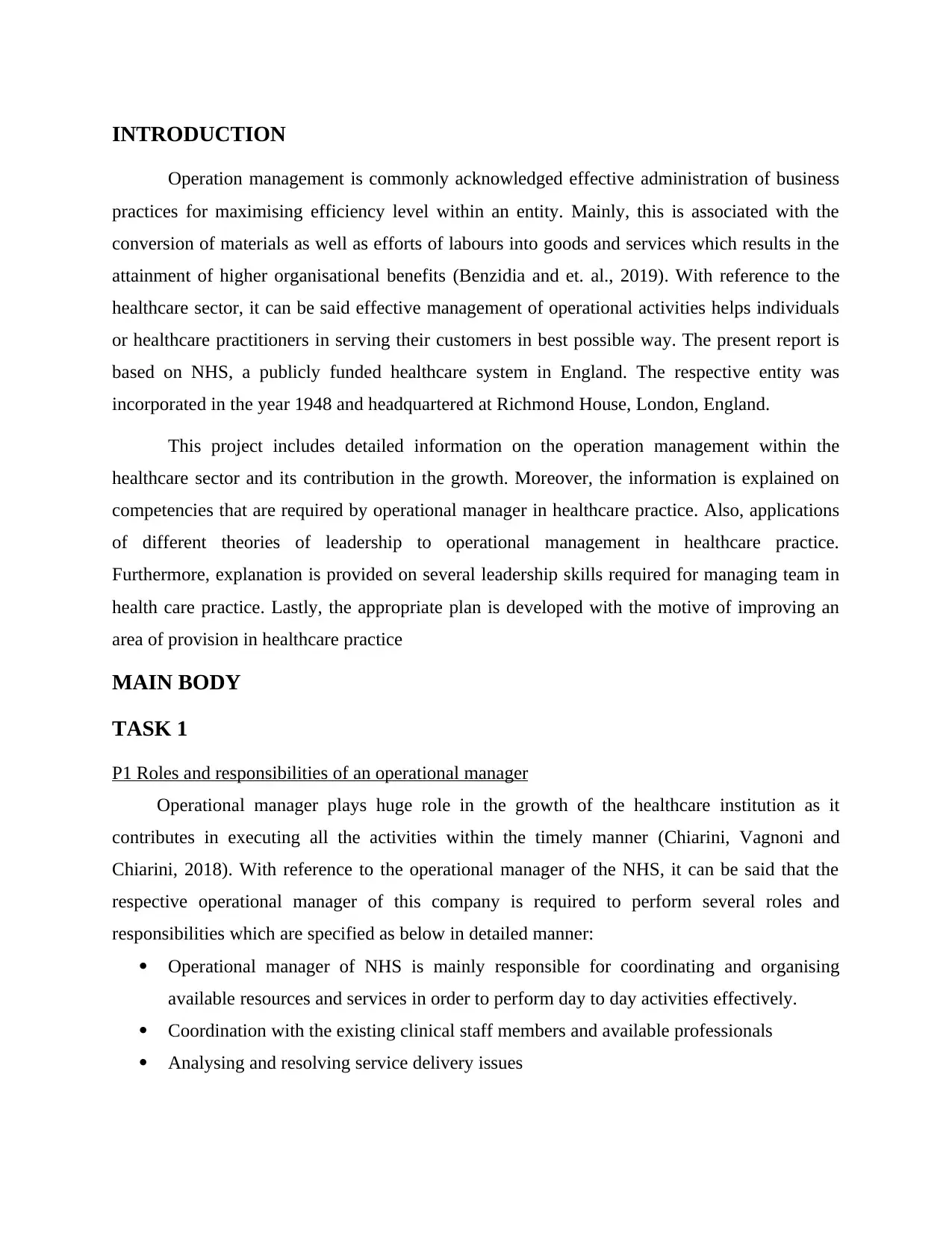
INTRODUCTION
Operation management is commonly acknowledged effective administration of business
practices for maximising efficiency level within an entity. Mainly, this is associated with the
conversion of materials as well as efforts of labours into goods and services which results in the
attainment of higher organisational benefits (Benzidia and et. al., 2019). With reference to the
healthcare sector, it can be said effective management of operational activities helps individuals
or healthcare practitioners in serving their customers in best possible way. The present report is
based on NHS, a publicly funded healthcare system in England. The respective entity was
incorporated in the year 1948 and headquartered at Richmond House, London, England.
This project includes detailed information on the operation management within the
healthcare sector and its contribution in the growth. Moreover, the information is explained on
competencies that are required by operational manager in healthcare practice. Also, applications
of different theories of leadership to operational management in healthcare practice.
Furthermore, explanation is provided on several leadership skills required for managing team in
health care practice. Lastly, the appropriate plan is developed with the motive of improving an
area of provision in healthcare practice
MAIN BODY
TASK 1
P1 Roles and responsibilities of an operational manager
Operational manager plays huge role in the growth of the healthcare institution as it
contributes in executing all the activities within the timely manner (Chiarini, Vagnoni and
Chiarini, 2018). With reference to the operational manager of the NHS, it can be said that the
respective operational manager of this company is required to perform several roles and
responsibilities which are specified as below in detailed manner:
Operational manager of NHS is mainly responsible for coordinating and organising
available resources and services in order to perform day to day activities effectively.
Coordination with the existing clinical staff members and available professionals
Analysing and resolving service delivery issues
Operation management is commonly acknowledged effective administration of business
practices for maximising efficiency level within an entity. Mainly, this is associated with the
conversion of materials as well as efforts of labours into goods and services which results in the
attainment of higher organisational benefits (Benzidia and et. al., 2019). With reference to the
healthcare sector, it can be said effective management of operational activities helps individuals
or healthcare practitioners in serving their customers in best possible way. The present report is
based on NHS, a publicly funded healthcare system in England. The respective entity was
incorporated in the year 1948 and headquartered at Richmond House, London, England.
This project includes detailed information on the operation management within the
healthcare sector and its contribution in the growth. Moreover, the information is explained on
competencies that are required by operational manager in healthcare practice. Also, applications
of different theories of leadership to operational management in healthcare practice.
Furthermore, explanation is provided on several leadership skills required for managing team in
health care practice. Lastly, the appropriate plan is developed with the motive of improving an
area of provision in healthcare practice
MAIN BODY
TASK 1
P1 Roles and responsibilities of an operational manager
Operational manager plays huge role in the growth of the healthcare institution as it
contributes in executing all the activities within the timely manner (Chiarini, Vagnoni and
Chiarini, 2018). With reference to the operational manager of the NHS, it can be said that the
respective operational manager of this company is required to perform several roles and
responsibilities which are specified as below in detailed manner:
Operational manager of NHS is mainly responsible for coordinating and organising
available resources and services in order to perform day to day activities effectively.
Coordination with the existing clinical staff members and available professionals
Analysing and resolving service delivery issues
⊘ This is a preview!⊘
Do you want full access?
Subscribe today to unlock all pages.

Trusted by 1+ million students worldwide
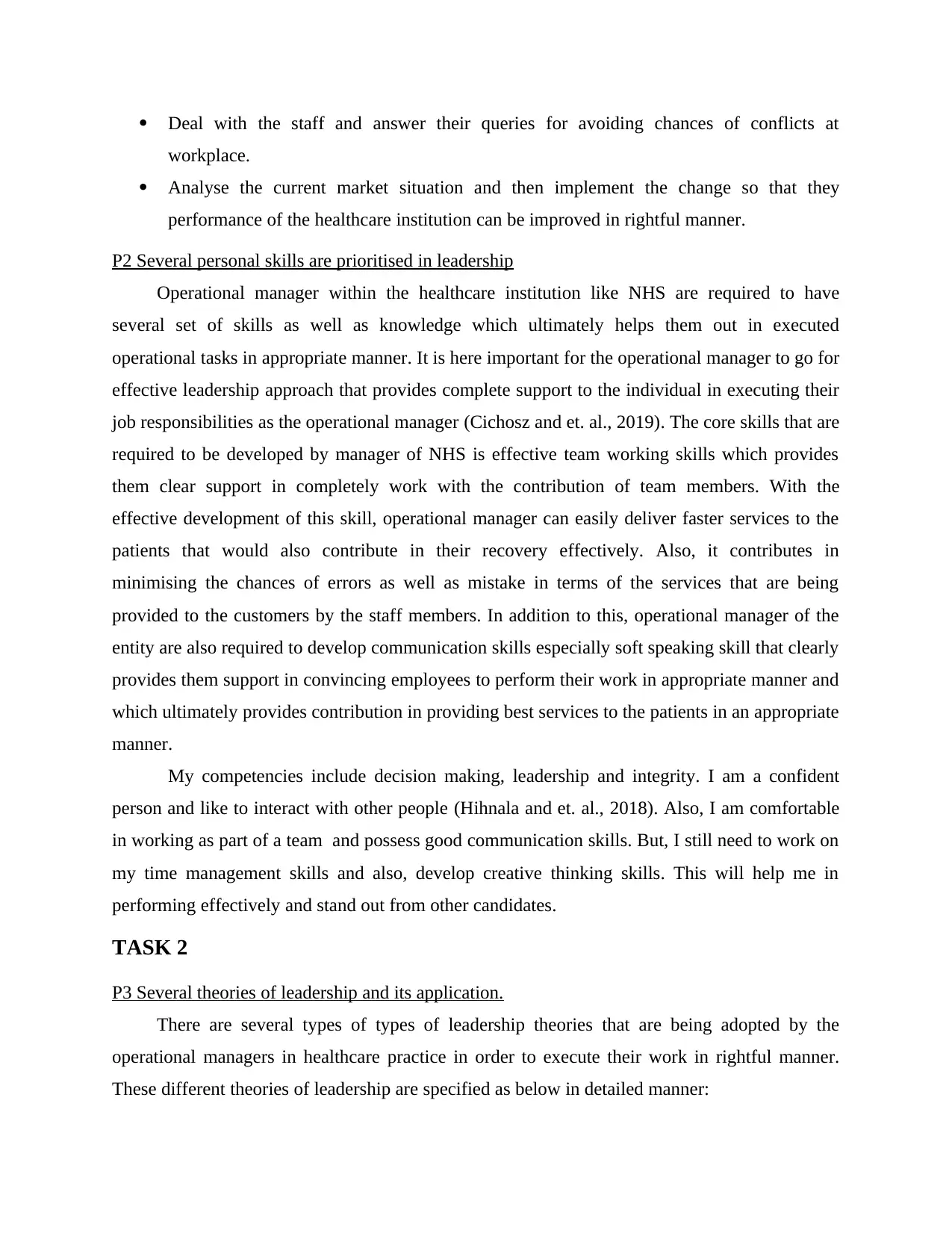
Deal with the staff and answer their queries for avoiding chances of conflicts at
workplace.
Analyse the current market situation and then implement the change so that they
performance of the healthcare institution can be improved in rightful manner.
P2 Several personal skills are prioritised in leadership
Operational manager within the healthcare institution like NHS are required to have
several set of skills as well as knowledge which ultimately helps them out in executed
operational tasks in appropriate manner. It is here important for the operational manager to go for
effective leadership approach that provides complete support to the individual in executing their
job responsibilities as the operational manager (Cichosz and et. al., 2019). The core skills that are
required to be developed by manager of NHS is effective team working skills which provides
them clear support in completely work with the contribution of team members. With the
effective development of this skill, operational manager can easily deliver faster services to the
patients that would also contribute in their recovery effectively. Also, it contributes in
minimising the chances of errors as well as mistake in terms of the services that are being
provided to the customers by the staff members. In addition to this, operational manager of the
entity are also required to develop communication skills especially soft speaking skill that clearly
provides them support in convincing employees to perform their work in appropriate manner and
which ultimately provides contribution in providing best services to the patients in an appropriate
manner.
My competencies include decision making, leadership and integrity. I am a confident
person and like to interact with other people (Hihnala and et. al., 2018). Also, I am comfortable
in working as part of a team and possess good communication skills. But, I still need to work on
my time management skills and also, develop creative thinking skills. This will help me in
performing effectively and stand out from other candidates.
TASK 2
P3 Several theories of leadership and its application.
There are several types of types of leadership theories that are being adopted by the
operational managers in healthcare practice in order to execute their work in rightful manner.
These different theories of leadership are specified as below in detailed manner:
workplace.
Analyse the current market situation and then implement the change so that they
performance of the healthcare institution can be improved in rightful manner.
P2 Several personal skills are prioritised in leadership
Operational manager within the healthcare institution like NHS are required to have
several set of skills as well as knowledge which ultimately helps them out in executed
operational tasks in appropriate manner. It is here important for the operational manager to go for
effective leadership approach that provides complete support to the individual in executing their
job responsibilities as the operational manager (Cichosz and et. al., 2019). The core skills that are
required to be developed by manager of NHS is effective team working skills which provides
them clear support in completely work with the contribution of team members. With the
effective development of this skill, operational manager can easily deliver faster services to the
patients that would also contribute in their recovery effectively. Also, it contributes in
minimising the chances of errors as well as mistake in terms of the services that are being
provided to the customers by the staff members. In addition to this, operational manager of the
entity are also required to develop communication skills especially soft speaking skill that clearly
provides them support in convincing employees to perform their work in appropriate manner and
which ultimately provides contribution in providing best services to the patients in an appropriate
manner.
My competencies include decision making, leadership and integrity. I am a confident
person and like to interact with other people (Hihnala and et. al., 2018). Also, I am comfortable
in working as part of a team and possess good communication skills. But, I still need to work on
my time management skills and also, develop creative thinking skills. This will help me in
performing effectively and stand out from other candidates.
TASK 2
P3 Several theories of leadership and its application.
There are several types of types of leadership theories that are being adopted by the
operational managers in healthcare practice in order to execute their work in rightful manner.
These different theories of leadership are specified as below in detailed manner:
Paraphrase This Document
Need a fresh take? Get an instant paraphrase of this document with our AI Paraphraser
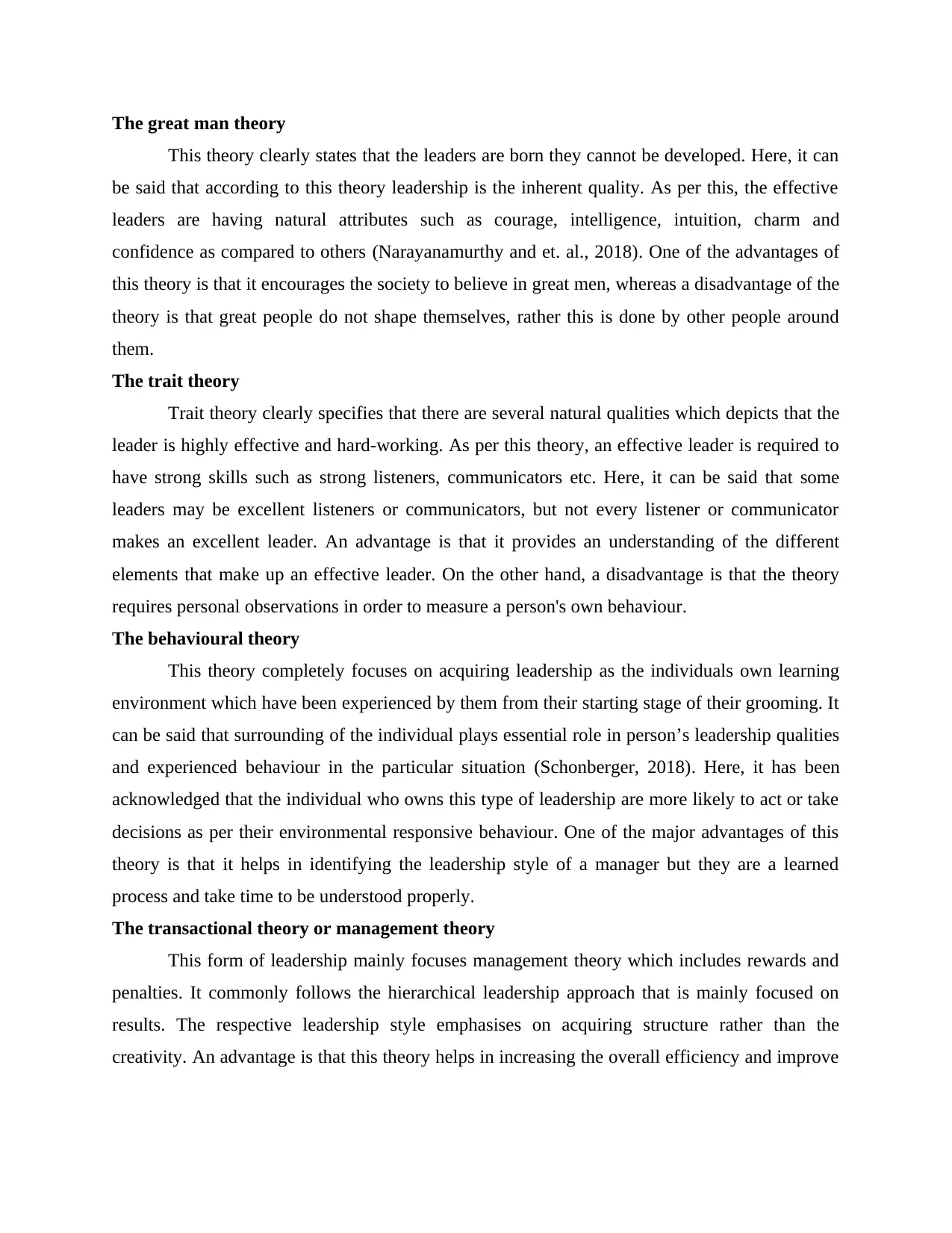
The great man theory
This theory clearly states that the leaders are born they cannot be developed. Here, it can
be said that according to this theory leadership is the inherent quality. As per this, the effective
leaders are having natural attributes such as courage, intelligence, intuition, charm and
confidence as compared to others (Narayanamurthy and et. al., 2018). One of the advantages of
this theory is that it encourages the society to believe in great men, whereas a disadvantage of the
theory is that great people do not shape themselves, rather this is done by other people around
them.
The trait theory
Trait theory clearly specifies that there are several natural qualities which depicts that the
leader is highly effective and hard-working. As per this theory, an effective leader is required to
have strong skills such as strong listeners, communicators etc. Here, it can be said that some
leaders may be excellent listeners or communicators, but not every listener or communicator
makes an excellent leader. An advantage is that it provides an understanding of the different
elements that make up an effective leader. On the other hand, a disadvantage is that the theory
requires personal observations in order to measure a person's own behaviour.
The behavioural theory
This theory completely focuses on acquiring leadership as the individuals own learning
environment which have been experienced by them from their starting stage of their grooming. It
can be said that surrounding of the individual plays essential role in person’s leadership qualities
and experienced behaviour in the particular situation (Schonberger, 2018). Here, it has been
acknowledged that the individual who owns this type of leadership are more likely to act or take
decisions as per their environmental responsive behaviour. One of the major advantages of this
theory is that it helps in identifying the leadership style of a manager but they are a learned
process and take time to be understood properly.
The transactional theory or management theory
This form of leadership mainly focuses management theory which includes rewards and
penalties. It commonly follows the hierarchical leadership approach that is mainly focused on
results. The respective leadership style emphasises on acquiring structure rather than the
creativity. An advantage is that this theory helps in increasing the overall efficiency and improve
This theory clearly states that the leaders are born they cannot be developed. Here, it can
be said that according to this theory leadership is the inherent quality. As per this, the effective
leaders are having natural attributes such as courage, intelligence, intuition, charm and
confidence as compared to others (Narayanamurthy and et. al., 2018). One of the advantages of
this theory is that it encourages the society to believe in great men, whereas a disadvantage of the
theory is that great people do not shape themselves, rather this is done by other people around
them.
The trait theory
Trait theory clearly specifies that there are several natural qualities which depicts that the
leader is highly effective and hard-working. As per this theory, an effective leader is required to
have strong skills such as strong listeners, communicators etc. Here, it can be said that some
leaders may be excellent listeners or communicators, but not every listener or communicator
makes an excellent leader. An advantage is that it provides an understanding of the different
elements that make up an effective leader. On the other hand, a disadvantage is that the theory
requires personal observations in order to measure a person's own behaviour.
The behavioural theory
This theory completely focuses on acquiring leadership as the individuals own learning
environment which have been experienced by them from their starting stage of their grooming. It
can be said that surrounding of the individual plays essential role in person’s leadership qualities
and experienced behaviour in the particular situation (Schonberger, 2018). Here, it has been
acknowledged that the individual who owns this type of leadership are more likely to act or take
decisions as per their environmental responsive behaviour. One of the major advantages of this
theory is that it helps in identifying the leadership style of a manager but they are a learned
process and take time to be understood properly.
The transactional theory or management theory
This form of leadership mainly focuses management theory which includes rewards and
penalties. It commonly follows the hierarchical leadership approach that is mainly focused on
results. The respective leadership style emphasises on acquiring structure rather than the
creativity. An advantage is that this theory helps in increasing the overall efficiency and improve
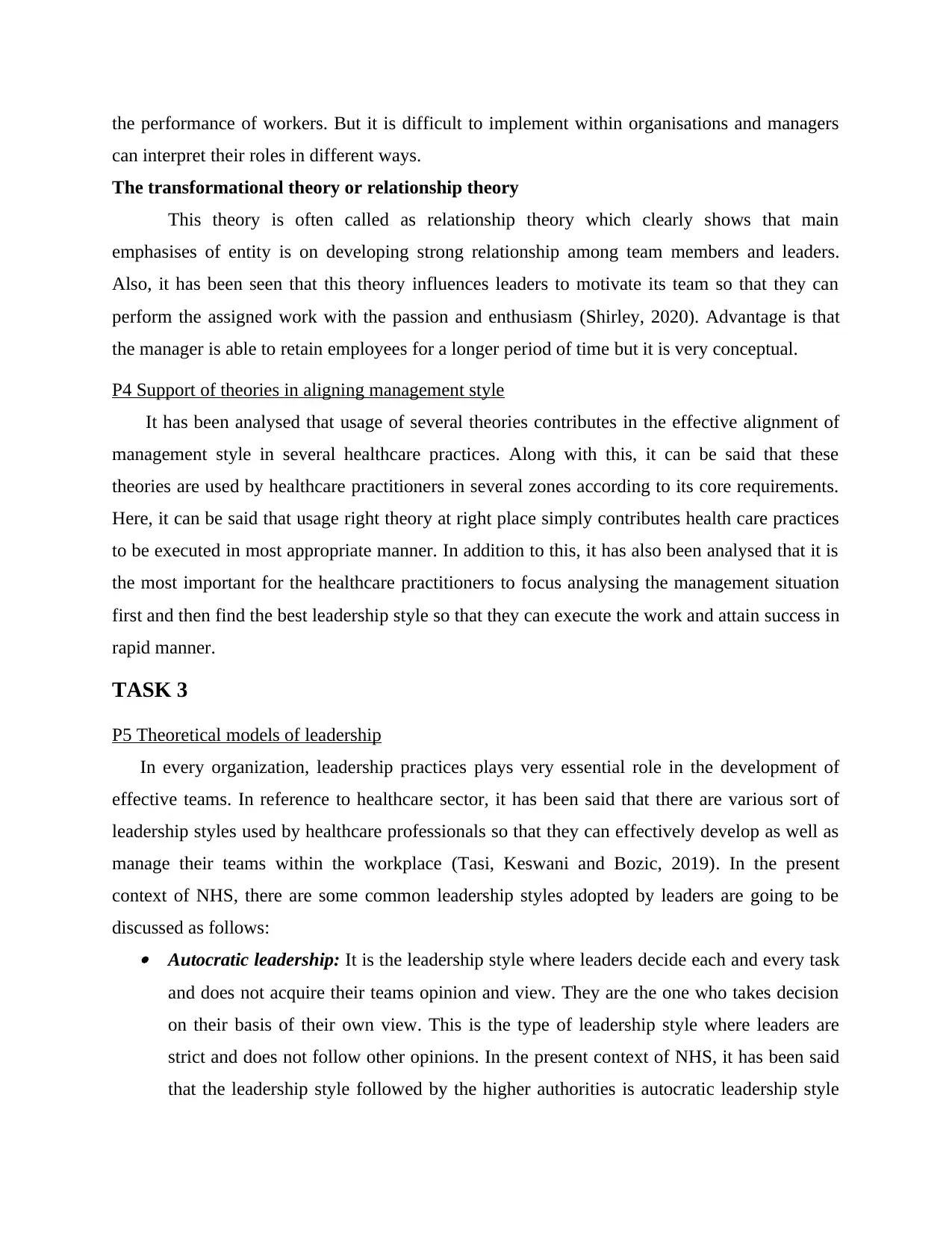
the performance of workers. But it is difficult to implement within organisations and managers
can interpret their roles in different ways.
The transformational theory or relationship theory
This theory is often called as relationship theory which clearly shows that main
emphasises of entity is on developing strong relationship among team members and leaders.
Also, it has been seen that this theory influences leaders to motivate its team so that they can
perform the assigned work with the passion and enthusiasm (Shirley, 2020). Advantage is that
the manager is able to retain employees for a longer period of time but it is very conceptual.
P4 Support of theories in aligning management style
It has been analysed that usage of several theories contributes in the effective alignment of
management style in several healthcare practices. Along with this, it can be said that these
theories are used by healthcare practitioners in several zones according to its core requirements.
Here, it can be said that usage right theory at right place simply contributes health care practices
to be executed in most appropriate manner. In addition to this, it has also been analysed that it is
the most important for the healthcare practitioners to focus analysing the management situation
first and then find the best leadership style so that they can execute the work and attain success in
rapid manner.
TASK 3
P5 Theoretical models of leadership
In every organization, leadership practices plays very essential role in the development of
effective teams. In reference to healthcare sector, it has been said that there are various sort of
leadership styles used by healthcare professionals so that they can effectively develop as well as
manage their teams within the workplace (Tasi, Keswani and Bozic, 2019). In the present
context of NHS, there are some common leadership styles adopted by leaders are going to be
discussed as follows: Autocratic leadership: It is the leadership style where leaders decide each and every task
and does not acquire their teams opinion and view. They are the one who takes decision
on their basis of their own view. This is the type of leadership style where leaders are
strict and does not follow other opinions. In the present context of NHS, it has been said
that the leadership style followed by the higher authorities is autocratic leadership style
can interpret their roles in different ways.
The transformational theory or relationship theory
This theory is often called as relationship theory which clearly shows that main
emphasises of entity is on developing strong relationship among team members and leaders.
Also, it has been seen that this theory influences leaders to motivate its team so that they can
perform the assigned work with the passion and enthusiasm (Shirley, 2020). Advantage is that
the manager is able to retain employees for a longer period of time but it is very conceptual.
P4 Support of theories in aligning management style
It has been analysed that usage of several theories contributes in the effective alignment of
management style in several healthcare practices. Along with this, it can be said that these
theories are used by healthcare practitioners in several zones according to its core requirements.
Here, it can be said that usage right theory at right place simply contributes health care practices
to be executed in most appropriate manner. In addition to this, it has also been analysed that it is
the most important for the healthcare practitioners to focus analysing the management situation
first and then find the best leadership style so that they can execute the work and attain success in
rapid manner.
TASK 3
P5 Theoretical models of leadership
In every organization, leadership practices plays very essential role in the development of
effective teams. In reference to healthcare sector, it has been said that there are various sort of
leadership styles used by healthcare professionals so that they can effectively develop as well as
manage their teams within the workplace (Tasi, Keswani and Bozic, 2019). In the present
context of NHS, there are some common leadership styles adopted by leaders are going to be
discussed as follows: Autocratic leadership: It is the leadership style where leaders decide each and every task
and does not acquire their teams opinion and view. They are the one who takes decision
on their basis of their own view. This is the type of leadership style where leaders are
strict and does not follow other opinions. In the present context of NHS, it has been said
that the leadership style followed by the higher authorities is autocratic leadership style
⊘ This is a preview!⊘
Do you want full access?
Subscribe today to unlock all pages.

Trusted by 1+ million students worldwide
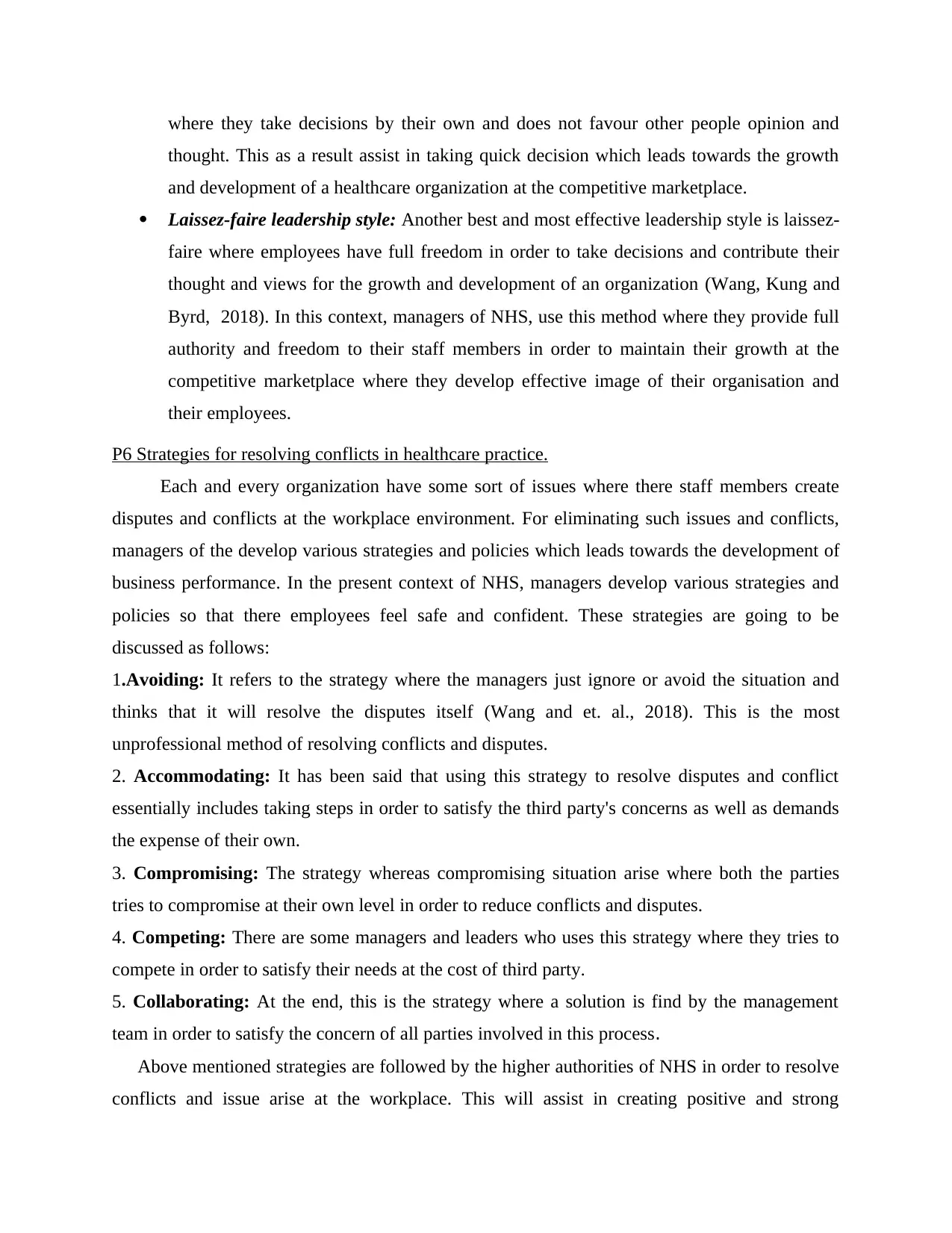
where they take decisions by their own and does not favour other people opinion and
thought. This as a result assist in taking quick decision which leads towards the growth
and development of a healthcare organization at the competitive marketplace.
Laissez-faire leadership style: Another best and most effective leadership style is laissez-
faire where employees have full freedom in order to take decisions and contribute their
thought and views for the growth and development of an organization (Wang, Kung and
Byrd, 2018). In this context, managers of NHS, use this method where they provide full
authority and freedom to their staff members in order to maintain their growth at the
competitive marketplace where they develop effective image of their organisation and
their employees.
P6 Strategies for resolving conflicts in healthcare practice.
Each and every organization have some sort of issues where there staff members create
disputes and conflicts at the workplace environment. For eliminating such issues and conflicts,
managers of the develop various strategies and policies which leads towards the development of
business performance. In the present context of NHS, managers develop various strategies and
policies so that there employees feel safe and confident. These strategies are going to be
discussed as follows:
1.Avoiding: It refers to the strategy where the managers just ignore or avoid the situation and
thinks that it will resolve the disputes itself (Wang and et. al., 2018). This is the most
unprofessional method of resolving conflicts and disputes.
2. Accommodating: It has been said that using this strategy to resolve disputes and conflict
essentially includes taking steps in order to satisfy the third party's concerns as well as demands
the expense of their own.
3. Compromising: The strategy whereas compromising situation arise where both the parties
tries to compromise at their own level in order to reduce conflicts and disputes.
4. Competing: There are some managers and leaders who uses this strategy where they tries to
compete in order to satisfy their needs at the cost of third party.
5. Collaborating: At the end, this is the strategy where a solution is find by the management
team in order to satisfy the concern of all parties involved in this process.
Above mentioned strategies are followed by the higher authorities of NHS in order to resolve
conflicts and issue arise at the workplace. This will assist in creating positive and strong
thought. This as a result assist in taking quick decision which leads towards the growth
and development of a healthcare organization at the competitive marketplace.
Laissez-faire leadership style: Another best and most effective leadership style is laissez-
faire where employees have full freedom in order to take decisions and contribute their
thought and views for the growth and development of an organization (Wang, Kung and
Byrd, 2018). In this context, managers of NHS, use this method where they provide full
authority and freedom to their staff members in order to maintain their growth at the
competitive marketplace where they develop effective image of their organisation and
their employees.
P6 Strategies for resolving conflicts in healthcare practice.
Each and every organization have some sort of issues where there staff members create
disputes and conflicts at the workplace environment. For eliminating such issues and conflicts,
managers of the develop various strategies and policies which leads towards the development of
business performance. In the present context of NHS, managers develop various strategies and
policies so that there employees feel safe and confident. These strategies are going to be
discussed as follows:
1.Avoiding: It refers to the strategy where the managers just ignore or avoid the situation and
thinks that it will resolve the disputes itself (Wang and et. al., 2018). This is the most
unprofessional method of resolving conflicts and disputes.
2. Accommodating: It has been said that using this strategy to resolve disputes and conflict
essentially includes taking steps in order to satisfy the third party's concerns as well as demands
the expense of their own.
3. Compromising: The strategy whereas compromising situation arise where both the parties
tries to compromise at their own level in order to reduce conflicts and disputes.
4. Competing: There are some managers and leaders who uses this strategy where they tries to
compete in order to satisfy their needs at the cost of third party.
5. Collaborating: At the end, this is the strategy where a solution is find by the management
team in order to satisfy the concern of all parties involved in this process.
Above mentioned strategies are followed by the higher authorities of NHS in order to resolve
conflicts and issue arise at the workplace. This will assist in creating positive and strong
Paraphrase This Document
Need a fresh take? Get an instant paraphrase of this document with our AI Paraphraser
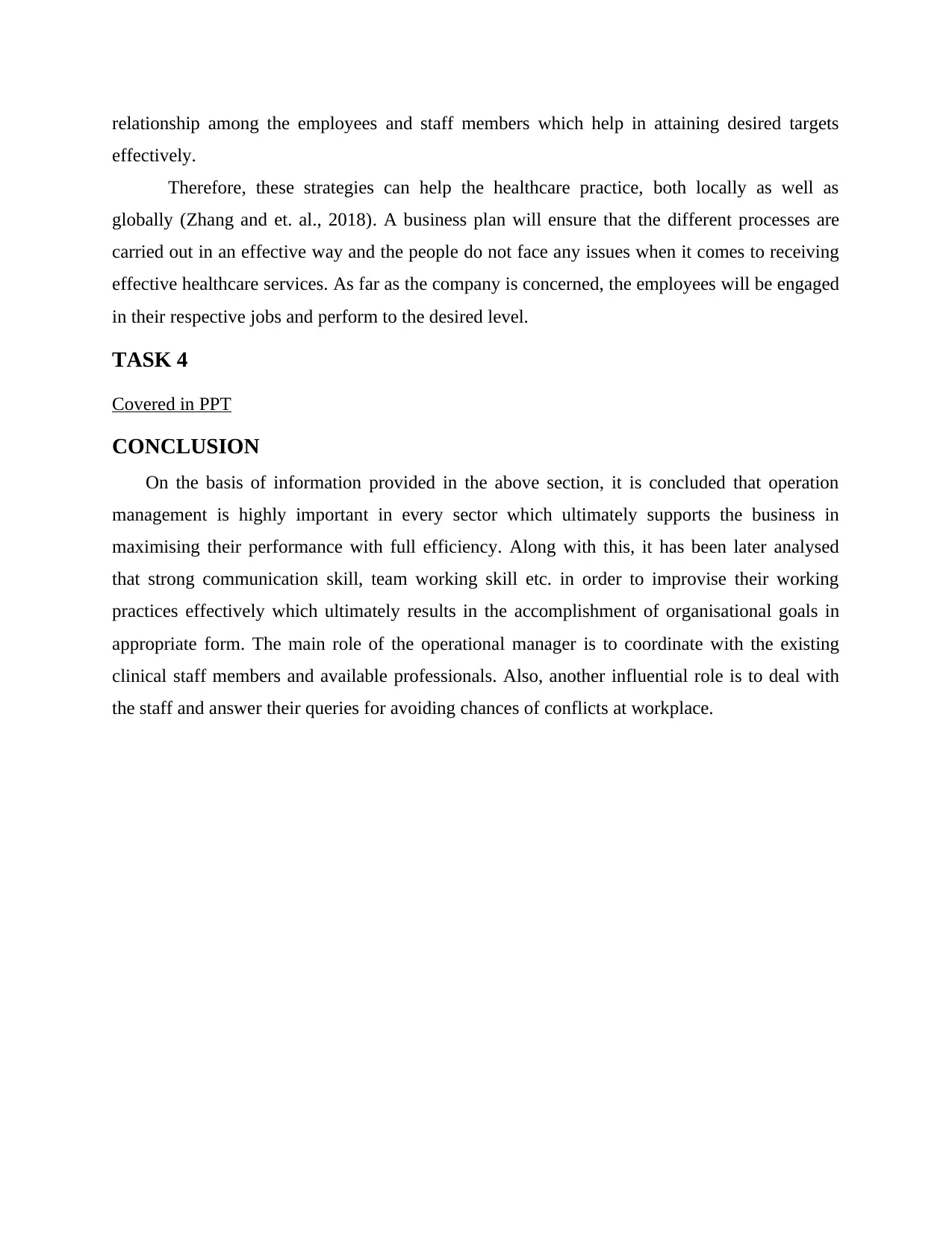
relationship among the employees and staff members which help in attaining desired targets
effectively.
Therefore, these strategies can help the healthcare practice, both locally as well as
globally (Zhang and et. al., 2018). A business plan will ensure that the different processes are
carried out in an effective way and the people do not face any issues when it comes to receiving
effective healthcare services. As far as the company is concerned, the employees will be engaged
in their respective jobs and perform to the desired level.
TASK 4
Covered in PPT
CONCLUSION
On the basis of information provided in the above section, it is concluded that operation
management is highly important in every sector which ultimately supports the business in
maximising their performance with full efficiency. Along with this, it has been later analysed
that strong communication skill, team working skill etc. in order to improvise their working
practices effectively which ultimately results in the accomplishment of organisational goals in
appropriate form. The main role of the operational manager is to coordinate with the existing
clinical staff members and available professionals. Also, another influential role is to deal with
the staff and answer their queries for avoiding chances of conflicts at workplace.
effectively.
Therefore, these strategies can help the healthcare practice, both locally as well as
globally (Zhang and et. al., 2018). A business plan will ensure that the different processes are
carried out in an effective way and the people do not face any issues when it comes to receiving
effective healthcare services. As far as the company is concerned, the employees will be engaged
in their respective jobs and perform to the desired level.
TASK 4
Covered in PPT
CONCLUSION
On the basis of information provided in the above section, it is concluded that operation
management is highly important in every sector which ultimately supports the business in
maximising their performance with full efficiency. Along with this, it has been later analysed
that strong communication skill, team working skill etc. in order to improvise their working
practices effectively which ultimately results in the accomplishment of organisational goals in
appropriate form. The main role of the operational manager is to coordinate with the existing
clinical staff members and available professionals. Also, another influential role is to deal with
the staff and answer their queries for avoiding chances of conflicts at workplace.
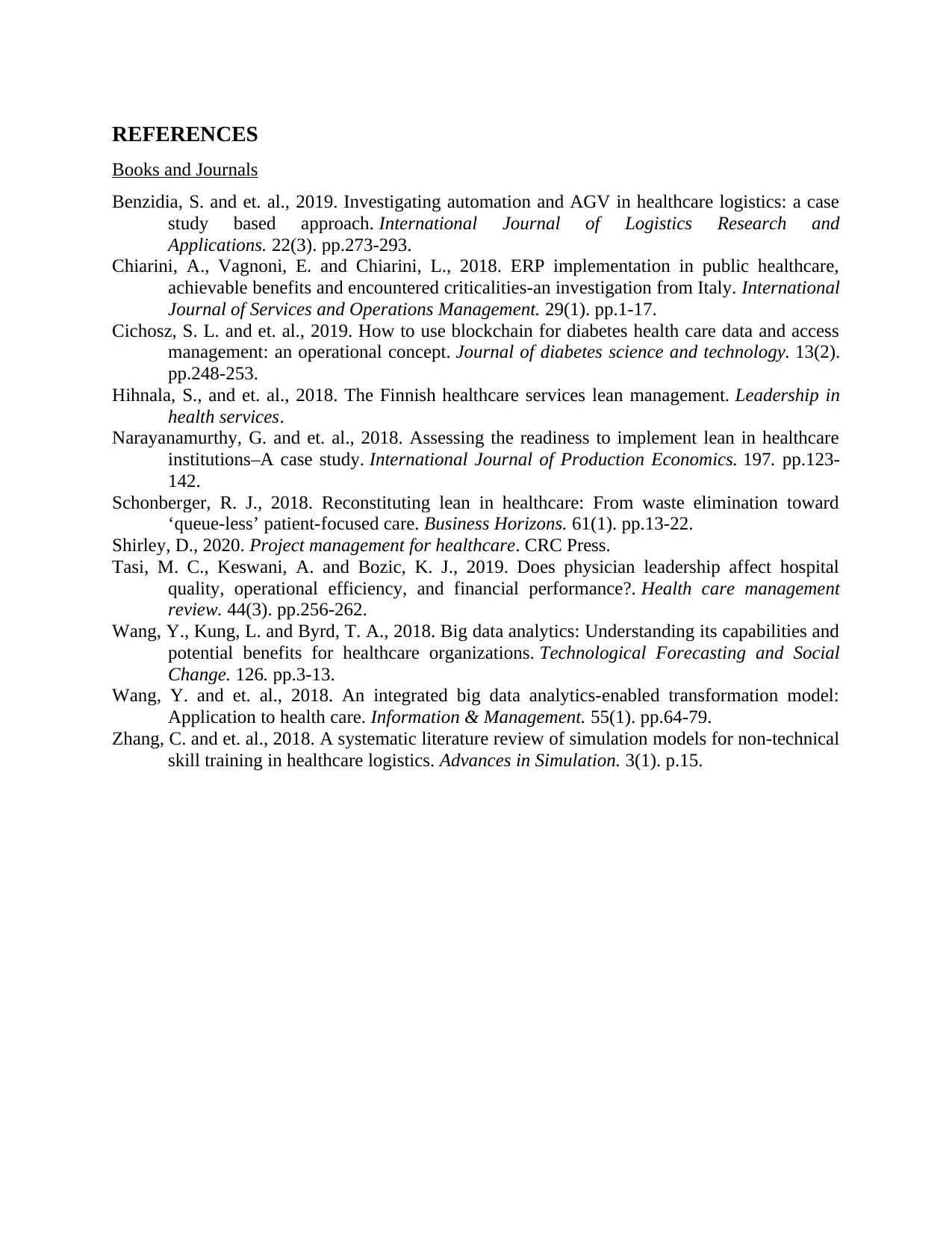
REFERENCES
Books and Journals
Benzidia, S. and et. al., 2019. Investigating automation and AGV in healthcare logistics: a case
study based approach. International Journal of Logistics Research and
Applications. 22(3). pp.273-293.
Chiarini, A., Vagnoni, E. and Chiarini, L., 2018. ERP implementation in public healthcare,
achievable benefits and encountered criticalities-an investigation from Italy. International
Journal of Services and Operations Management. 29(1). pp.1-17.
Cichosz, S. L. and et. al., 2019. How to use blockchain for diabetes health care data and access
management: an operational concept. Journal of diabetes science and technology. 13(2).
pp.248-253.
Hihnala, S., and et. al., 2018. The Finnish healthcare services lean management. Leadership in
health services.
Narayanamurthy, G. and et. al., 2018. Assessing the readiness to implement lean in healthcare
institutions–A case study. International Journal of Production Economics. 197. pp.123-
142.
Schonberger, R. J., 2018. Reconstituting lean in healthcare: From waste elimination toward
‘queue-less’ patient-focused care. Business Horizons. 61(1). pp.13-22.
Shirley, D., 2020. Project management for healthcare. CRC Press.
Tasi, M. C., Keswani, A. and Bozic, K. J., 2019. Does physician leadership affect hospital
quality, operational efficiency, and financial performance?. Health care management
review. 44(3). pp.256-262.
Wang, Y., Kung, L. and Byrd, T. A., 2018. Big data analytics: Understanding its capabilities and
potential benefits for healthcare organizations. Technological Forecasting and Social
Change. 126. pp.3-13.
Wang, Y. and et. al., 2018. An integrated big data analytics-enabled transformation model:
Application to health care. Information & Management. 55(1). pp.64-79.
Zhang, C. and et. al., 2018. A systematic literature review of simulation models for non-technical
skill training in healthcare logistics. Advances in Simulation. 3(1). p.15.
Books and Journals
Benzidia, S. and et. al., 2019. Investigating automation and AGV in healthcare logistics: a case
study based approach. International Journal of Logistics Research and
Applications. 22(3). pp.273-293.
Chiarini, A., Vagnoni, E. and Chiarini, L., 2018. ERP implementation in public healthcare,
achievable benefits and encountered criticalities-an investigation from Italy. International
Journal of Services and Operations Management. 29(1). pp.1-17.
Cichosz, S. L. and et. al., 2019. How to use blockchain for diabetes health care data and access
management: an operational concept. Journal of diabetes science and technology. 13(2).
pp.248-253.
Hihnala, S., and et. al., 2018. The Finnish healthcare services lean management. Leadership in
health services.
Narayanamurthy, G. and et. al., 2018. Assessing the readiness to implement lean in healthcare
institutions–A case study. International Journal of Production Economics. 197. pp.123-
142.
Schonberger, R. J., 2018. Reconstituting lean in healthcare: From waste elimination toward
‘queue-less’ patient-focused care. Business Horizons. 61(1). pp.13-22.
Shirley, D., 2020. Project management for healthcare. CRC Press.
Tasi, M. C., Keswani, A. and Bozic, K. J., 2019. Does physician leadership affect hospital
quality, operational efficiency, and financial performance?. Health care management
review. 44(3). pp.256-262.
Wang, Y., Kung, L. and Byrd, T. A., 2018. Big data analytics: Understanding its capabilities and
potential benefits for healthcare organizations. Technological Forecasting and Social
Change. 126. pp.3-13.
Wang, Y. and et. al., 2018. An integrated big data analytics-enabled transformation model:
Application to health care. Information & Management. 55(1). pp.64-79.
Zhang, C. and et. al., 2018. A systematic literature review of simulation models for non-technical
skill training in healthcare logistics. Advances in Simulation. 3(1). p.15.
⊘ This is a preview!⊘
Do you want full access?
Subscribe today to unlock all pages.

Trusted by 1+ million students worldwide
1 out of 9
Related Documents
Your All-in-One AI-Powered Toolkit for Academic Success.
+13062052269
info@desklib.com
Available 24*7 on WhatsApp / Email
![[object Object]](/_next/static/media/star-bottom.7253800d.svg)
Unlock your academic potential
Copyright © 2020–2025 A2Z Services. All Rights Reserved. Developed and managed by ZUCOL.





